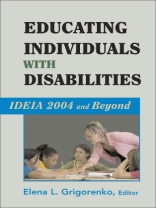Before the passage of the Education for All Handicapped Children Act in 1975, U.S. students with physical and learning disabilities frequently went undiagnosed, received inadequate treatment, or were even barred from attending school. And until recently, traditional measures of learning disability were often too crude to separate the learning-disabled student from students having academic difficulties due to other reasons, such as emotional issues or language problems.
Grigorenko’s new book discusses how learning-disabled students are identified and assessed today, in light of the 2004 Individuals with Disabilities Education Improvement Act. One of the major changes in IDEIA 2004, for instance, is the ‘Response to Intervention’ (RTI) provision, which allows school districts to better identify students with legitimate learning disabilities and provide them with individualized, evidence-based instruction.
Grigorenko’s interdisciplinary collection is the first to comprehensively review the IDEIA 2004 Act and distill the changes professionals working with learning-disabled students face. The text takes an overarching perspective, first discussing the IDEIA in its historical, political, and legal context, then covering practical issues professionals address on a daily basis. Educating Individuals with Disabilities is a priceless resource for school psychologists, neuropsychologists, speech-language therapists, administrators, policy makers, and legal professionals who navigate special education and learning disability issues on a daily basis.
Table of Content
‘
Contributors
Introduction,
Barbara R. Foorman
Part I: Educating Individuals with Disabilities
Issues and Developments in Special Education, Dabie Nabuzoka Policy and Law of Individuals With Disabilities Education Improvement Act of 2004: Attempting No Student with Disabilities Left Behind To The Extent Enforceable, Andrea Kayne Kaufman Part II: The Reauthorization of the Individuals With Disabilities Education Improvement Act of 2004 (IDEIA): Concepts and Constructs–Old, New, and Modified
The Law and Reality: Understanding the Individuals With Disabilities Education Improvement Act, Mary Konya Weishaar From Policy to Practice: IDEIA and Evidence-based Practice, Ronnie Detrich Response to Intervention: A Strategy for the Prevention and Identification of Learning Disabilities, Lynn S. Fuchs, Douglas Fuchs, and Rebecca O. Zumeta Learning Disability Identification: How Does It Apply to English Language Learners? Peggy Mc Cardle, Chandra Keller-Allen, and Tanya Shuy IDEIA 2004 and Specific Learning Disabilities: What Role does Intelligence Play? Jack A. Naglieri and Alan S. Kaufman Assessment and Eligibility of Students With Disabilities, Jennifer H. Lindstrom, Elizabeth D. Tuckwiller, and Daniel P. Hallahan Systems of Instruction and Assessment to Improve Mathematics Achievement for Students With Disabilities: The Potential and Promise of RTI, David J. Chard, Leanne R. Ketterlin-Geller, and Asha Jitendra English Language Learners and Response to Intervention: Improving Quality of Instruction in General and Special Education, Scott K. Baker and Doris Luft Baker Response to Intervention and Teacher Preparation, Louise Spear-Swerling Twice-Exceptional Students: Being Gifted and Learning Disabled–Implications of the IDEIA, Tonya R. Moon, Catherine M. Brighton, Carolyn M. Callahan, and Jane M. Jarvis High Stakes Testing and Students With Disabilities: Why Federal Policy Needs to Be Changed, Stuart S. Yeh Individual Education Program, Barbara C. Gartin and Nikki L. Murdick Behavior Intervention Plans, Susan Etscheidt and Kerri Clopton Part III: From the Front Lines
Increasing the Academic Performance of Struggling Students and Students With Disabilities in Underperforming Schools, Denise Hexom, Judith Menoher, Bonnie A. Plummer, and Mary Stone Local Educational Authorities and IDEIA, Linda J. Hawkins and Michael N. Riley New Individuals With Disabilities Educational Improvement Act and Psychological Assessment: From Policy to Practice, Michele Goyette-Ewing and Sherin Stahl Reading Assessment and IDEIA: The Science Made Practical, Saylor Heidmann How Private Practice Should Respond to IDEIA 2004, Eric R. Arzubi The Road Just Started: Concluding Remarks from the Editor, Elena L. Grigorenko Index
‘












